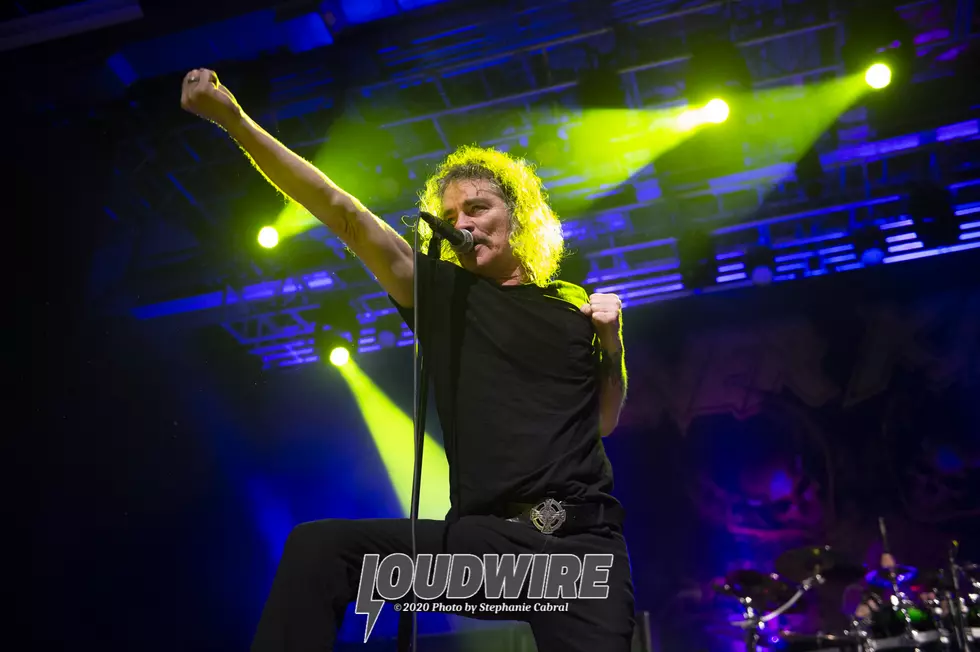
Overkill Up the Irons With ‘Ironbound’ — Exclusive Videos

They're getting ready to enter the 25th year since the release of their debut album 'Feel the Fire,' but New Jersey thrash metal veterans Overkill aren't content to live in the past. On Feb. 9, the band will drop its 15th studio album, 'Ironbound,' on the metal masses. And the impact should be greater than a cluster bomb on a chemical factory. Thrashier than 2007's 'Immortalis,' but written with wit, forethought and insatiable hunger, the new album exhibits equal amounts of heaviness and intelligence. Years down the line, it will likely still stand as one of Overkill's finest albums.
The band members worked on 'Ironbound' with Swedish mixer Peter Tagtgren (Pain, Hypocrisy, Dimmu Borgir) and recorded it at a time when they had no label deal. Such risks paid off, allowing Overkill to produce from the gut as well as the mind in order to maximize their artistic vision. Noisecreep talked with Frontman Bobby 'Blitz' Ellsworth about the making of 'Ironbound,' the freedom of being untethered and the decision to work with one of the architects of Swedish death metal.
How did you want 'Ironbound' to be different than 'Immortalis'?
I think that there are marked differences between 'Immortalis' and 'Ironbound.' But I do think that a necessary step was 'Immortalis' to 'Ironbound.' I think the band has never really left it's root of -- let's say thrash -- but there seems to be time periods of immensity with regards to what we do. And I think it's always about stepping it up, ramping it up, testing the limits, exploring new limits, maybe changing what the bar is for ourselves or raising that bar. So I think that we've raised the bar from 'Immortalis' to 'Ironbound' based on the energy level and that's what I think is always the key to this subgenre. If you can get this energy level to transfer naturally from individual to performance to tape, then I think you've succeeded. You've reached the goal. And I think that was the goal.
Was 'Ironbound' an enjoyable record to make?
'Ironbound' was a fun session. And it's because we came off the road, and coming off the road usually has a band in the mindset of working like a machine. And if you're working like a machine, things kind of roll off you a lot easier. We found that we were obtaining the performances we wanted quickly, and what this did was give us the luxury of time. So we're not using all that time up. We have time to push the songs, to raise the bar. Do you speed up the tempo? Do you slow it down? We can try both and see which one we like more. And having that luxury gave us the opportunity to really enjoy as opposed to pine over the music -- 'oh, the songs not done' or 'oh, it just needs a little something and I can't figure out what it is.' None of that came up. We were done so far ahead of time we actually went back and redid some of the vocals or did a whole second vocal track to see what Peter [Tagtgren], who mixed the record, might wanna do with something like that. So it was really the luxury of time which was really positive and really fun.
Your last album was on Bodog Records, but you had no record deal signed when you recorded 'Ironbound.' Was that frightening or somehow liberating?
Not having a record deal when this album was created and assembled was actually a real feeling of freedom. One of the cool things about this community is the initial reason we do things is not [thought out] in depth. It's 'just because,' and it's just how it makes us feel. And I think one of the cool things about 'Ironbound' is that it was 'because' as opposed to what the scene dictated or what a record company needed with regard to a time frame. There's a huge amount of freedom in that. There's a huge amount of motivation, because if you think about why a young band demos, why that voice in the dark needs to be heard, there's no other reason but 'because I want it to be heard.' So I think that's the extra star on the chest of 'Ironbound.' It was done just because and with no record deal.
When was the bulk of 'Ironbound' written?
[Bassist] D.D. [Verni] is the riff collector for us. And I don't think a riff collector ever stops writing or sets a time frame, because I don't think you ever know a riff is going to come or when an idea comes. I think you just have to be prepared to save it. So, the 'Immortalis' record was realized in late 2007. D.D. was already collecting riffs in early 2008 for what turned into 'Ironbound.' We finished touring in March 2009 and assembled between April and August of 2009. So we actually had that luxury of time throughout this whole thing.
Why did you end up working with Peter Tagtgren, who's better known for working with more underground death and black metal bands?
We just liked what he had been doing. We were just aware of it. I think that having Peter involved in this record is really about us still keeping our fingers on the pulse. You have to know what's going on in the scene to know what's out there. We obviously love this. I was always proud to say I stagedived at a Slayer show before I played one note for Overkill. They were probably within a month of each other but a fan, I think, is a fan. And we became fans of his work with regard to Pain, Hypocrisy, Arch Enemy and the Dimmu Borgir productions. I suppose that if you want to stay current you need to know what's going on, and we involved Peter as far back as when we were assembling the record. We got in touch with Peter early 2009.
Did Peter bring a new perspective to the table?
What Peter brought to us was a huge sense of fear -- not because of his abilities, but this was the first record where we were not in the control room. Peter was mixing in Sweden, we were in New Jersey waiting for the mixes to come via the Net, and so I think that our experience with regard to mixing is, 'I need to hear more kick drums. Or, 'The kicks need to be tightened up a little. Frequencies need to be added or subtracted. Maybe the vocals need to go up or down.' But I don't hear this [back from] Peter until the next day, because we're commenting via the Net and telephone. But I think that what he gave to me specifically was the opportunity to realize that if a guy is a fan of the music and mixing like Peter is, then everything turns to the right direction. And I think what he gave us is more of a contemporary presentation but it's almost gone back to an organic sounding drum in some cases as opposed to a computer-generated sound. And ultimately I think Peter made the band sound more like a band.
More From Noisecreep









